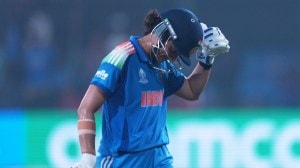High `spirits’ take labourers to new heights
SURAT, May 3: Drink and the devil hath done for the rest.Yo ho ho and a bottle of rum.These two lines were what kept Long John Silver going ...

SURAT, May 3: Drink and the devil hath done for the rest.
Yo ho ho and a bottle of rum.
These two lines were what kept Long John Silver going relentlessly in his mutiny in Robert Louis Stevenson’s Treasure Island — to the extent that he got the very existence of the Hispaniola into danger. Yes, the bottle of rum or in the desi context – the potli (a transparent plastic bag containing country-made liquor) gets a man’s juices flowing.
Such varied do people behave after gulping down alcohol that one cannot but wonder as to what is it in the daaru that brings out the beast, the child, the joker and the shaayar out of a person. And if experiences of these people are lessons to be learnt, then drunkards do have a lesson to teach.
Consider these. A skinny manual labourer has gulped down some brew at the end of a hard day’s work. A policeman comes around and tries to bully him. The very same fellow, who would not have withstood even the sight of a policeman if sober, stands up against him and and even delivers one blow.
The fighting spirit.
Another chap, a known ruffian of the area, collects haftas and does all that a Hindi film goonda does. However, after a heavy dose in the evening he asks for forgiveness from every person he sees. He presents such a pitiable sight that one would wish he was drunk all the time. The meek spirit.There is another guy in the neighbourhood, who is a die-hard fan of anything slang and obscene. If he is sober and is singing, it should be a colourful, double-meaning Govinda-Karishma number. But the moment he has the kick, he switches onto soothing romantic duets of the 70’s. And if the kick is real hard, then of course he will settle for nothing less than Ghulam Ali or Jagjit Singh (provided at least four to five potlis have been gulped down). That is the artistic spirit.
Then of course, there is the bad side of the story. Women are bashed up, kicked out of the house, the children land up on the streets, so on and so forth. Pitifully, this side of the story is more prominently reported that the other-side of the story, which has a more humourous and harmless angle to it.
In fact there are people, who under the influence of alcohol, would weep their hearts out or on more happier occasions take anyone out for a dinner and spend whatever money they have.
If cinema is a reflection of the society, we have all the nice guys getting hooked on to alcohol because of the failure of a relationship. Then all the ghazal and qawali greats have glorified liquor to glorious heights too.
Gandhiji’s Gujarat.
That means prohibition is in effect. But a stroll on some of the backlanes, a walk through the streets after sunset or even peeping into the neighbour’s window in the evening brings out these realities. That alcohol is bad, there is no doubt, but saying that it’s effect is nothing but disastrous is a little bit of an exaggeration.





- 01
- 02
- 03
- 04
- 05


























